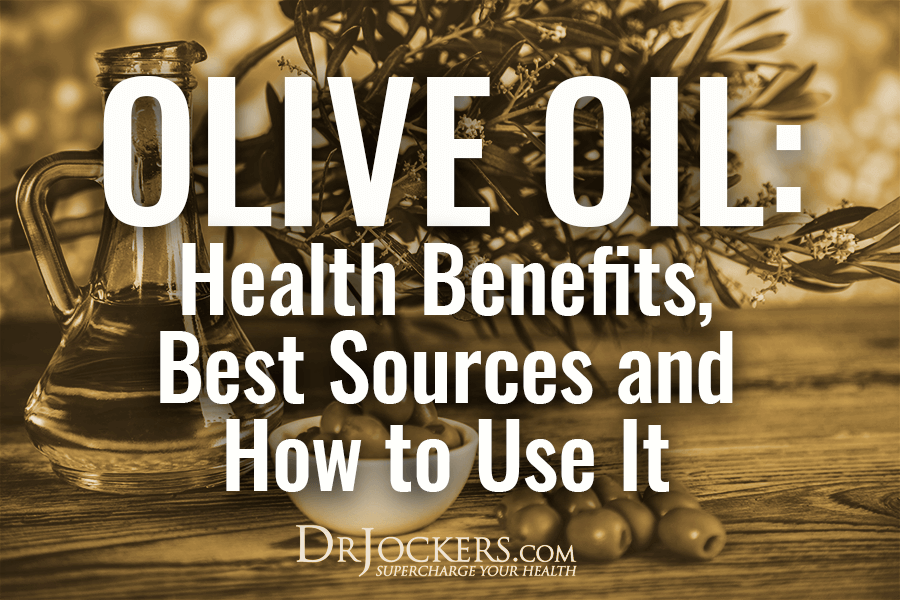 Olive Oil: Health Benefits, Best Sources and How to Use It
Olive Oil: Health Benefits, Best Sources and How to Use It
Olive oil has been harvested for thousands of years. It is widely respected in nutrition circles for its anti-inflammatory and other health benefits. It helps to reduce inflammation, aids in weight loss, improves insulin sensitivity, supports brain health, boosts immune health, offers anti-aging effects, and supports a healthy mood among other health benefits.
However, not all olive oil is made equal. Many olive oils on the market are of lower quality with fewer health benefits. Some of the olive oil bottles you see are falsely advertised and are not even olive oil. If you want to enjoy the benefits of olive oil, you have to understand how to buy the highest quality extra-virgin olive oil.
In this article, you will learn what olive oil is. I will discuss the key nutrients in olive oil. I will go over the nutrition facts of olive oil. You will learn about the major health benefits of olive oil. I will offer an easy guide on how to buy olive oil to make sure that you are selecting the healthiest and safest quality out there. I will share some tips on how to cook with olive oil. Finally, I will share my favorite olive oil I use daily and a great discount so you can enjoy it too.
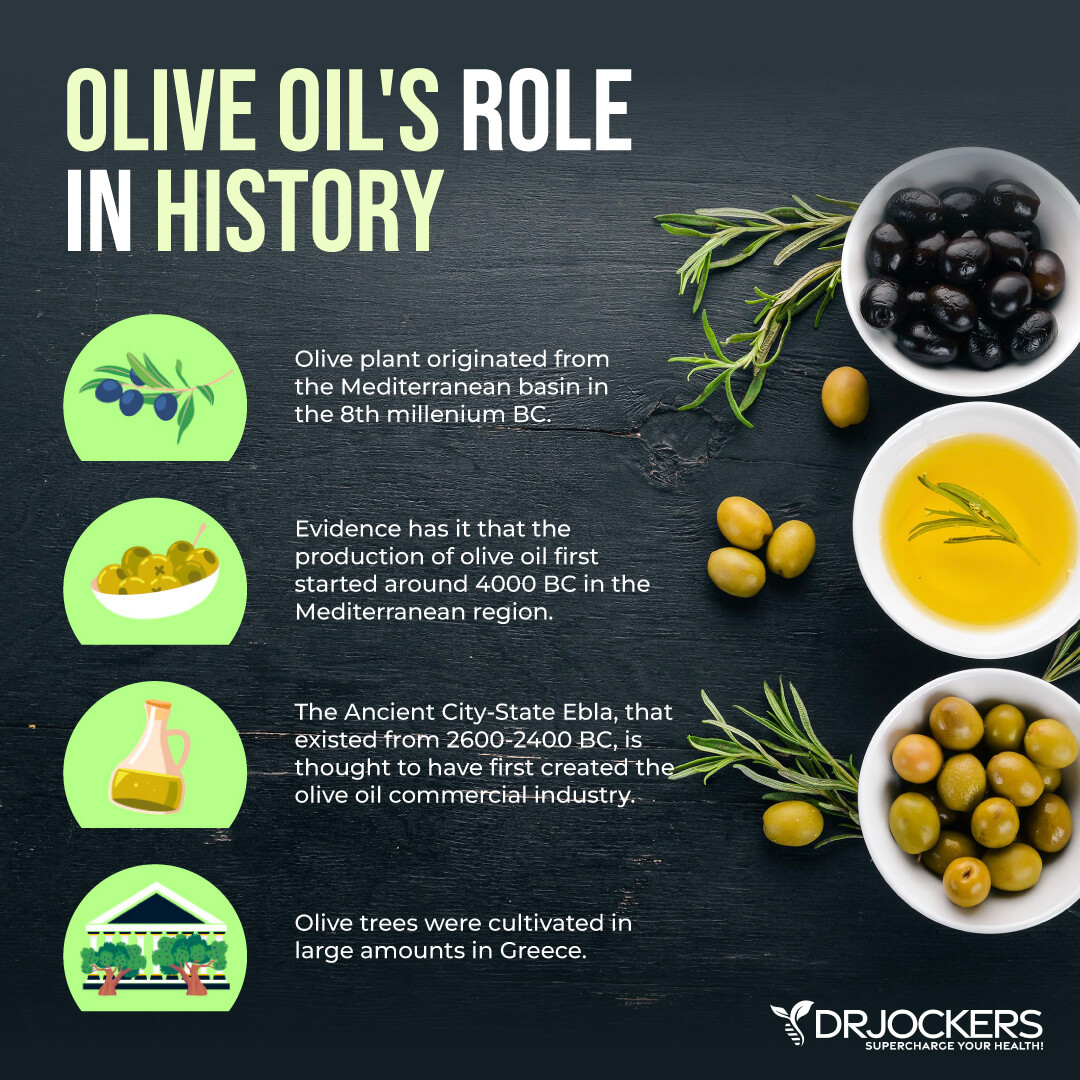
What is Olive Oil
Olives are the fruit of the olive tree (Olea europaea). Olives are not only delicious, but they are rich in healthy monosaturated fatty acids (MUFAs).
Olive harvesting and making olive oil dates back thousands of years and it’s an important part of the culture and everyday life in many parts of the world. However, olive oil has overtaken the world in the past century. They have been cultivated and used in Turkey, Italy, Spain, Croatia, and other parts of the Mediterranean and Balkans.
Olive trees first made their way to North America in the mid-1500s. Olive trees spread. In the Americas, they are mainly cultivated in Mexico, Peru, Chile, Argentina, and California in North America. The international commercial olive oil industry is relatively new yet worth hundreds of millions of dollars.
Olive oil is a popular and healthy oil. It is often mentioned as a key healthy ingredient of the Mediterranean diet. According to a 2009 review published in Critical Reviews in Food Science and Nutrition, it may help to lower inflammation and oxidative damage (1). A 2020 systematic review and meta-analysis published in Nutrition has also found that it is a powerful anti-inflammatory food (2). It may help to reduce the risk of atherosclerosis, cardiovascular disease, and cancer. Some of these benefits of virgin olive oils may come from their biologically active phenolic compounds.
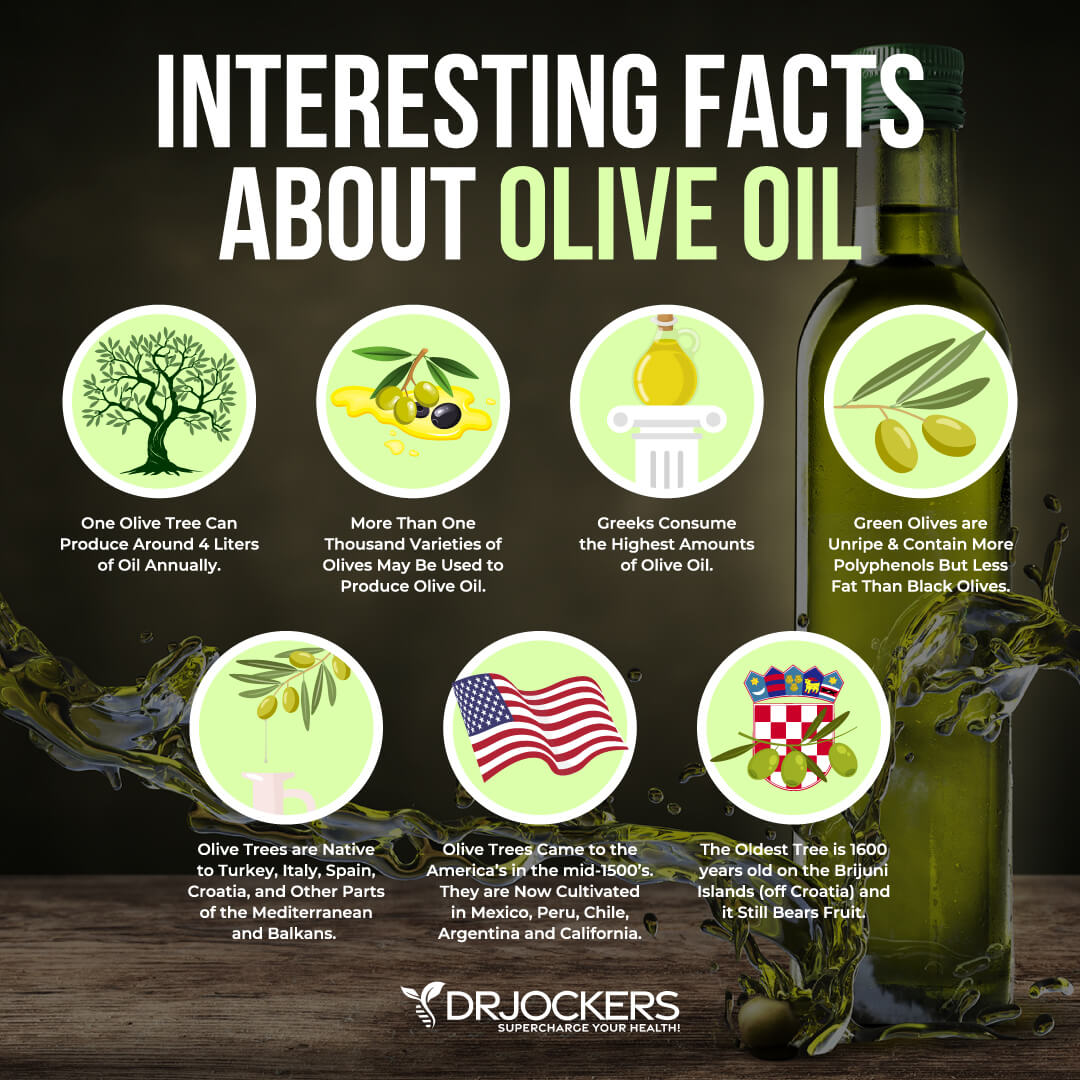
Olive Oil is a Nutritional Powerhouse
As you know, there are many nutritional strategies out there. Dietitians, nutritionists, and doctors don’t often agree on what’s the best one and the truth is, we all have our own individual needs at some level. But what most experts agree on is that olive oil is healthy, as a 2018 article published in Nutrients stated (3).
A 2020 systematic review and meta-analysis published in Nutrition has found that olive oil phenolics offer a variety of health benefits, including reduced inflammation, decreased oxidative damage, improved platelet and cellular function, improved antimicrobial activity, and improved plasma lipoproteins (2).
Now, olive oils are not all the same. There are many different types out there: regular olive oil, virgin olive oil, and extra virgin olive oil (EVOO). But you can’t always trust the bottle. It’s not uncommon to find a cheap bottle advertised as ‘extra virgin olive oil’ at a regular grocery store that’s actually GMO canola oil with herb flavors. The good news is that in this article, I will offer you some tips on how to choose the best type of olive oil and avoid fake oils.
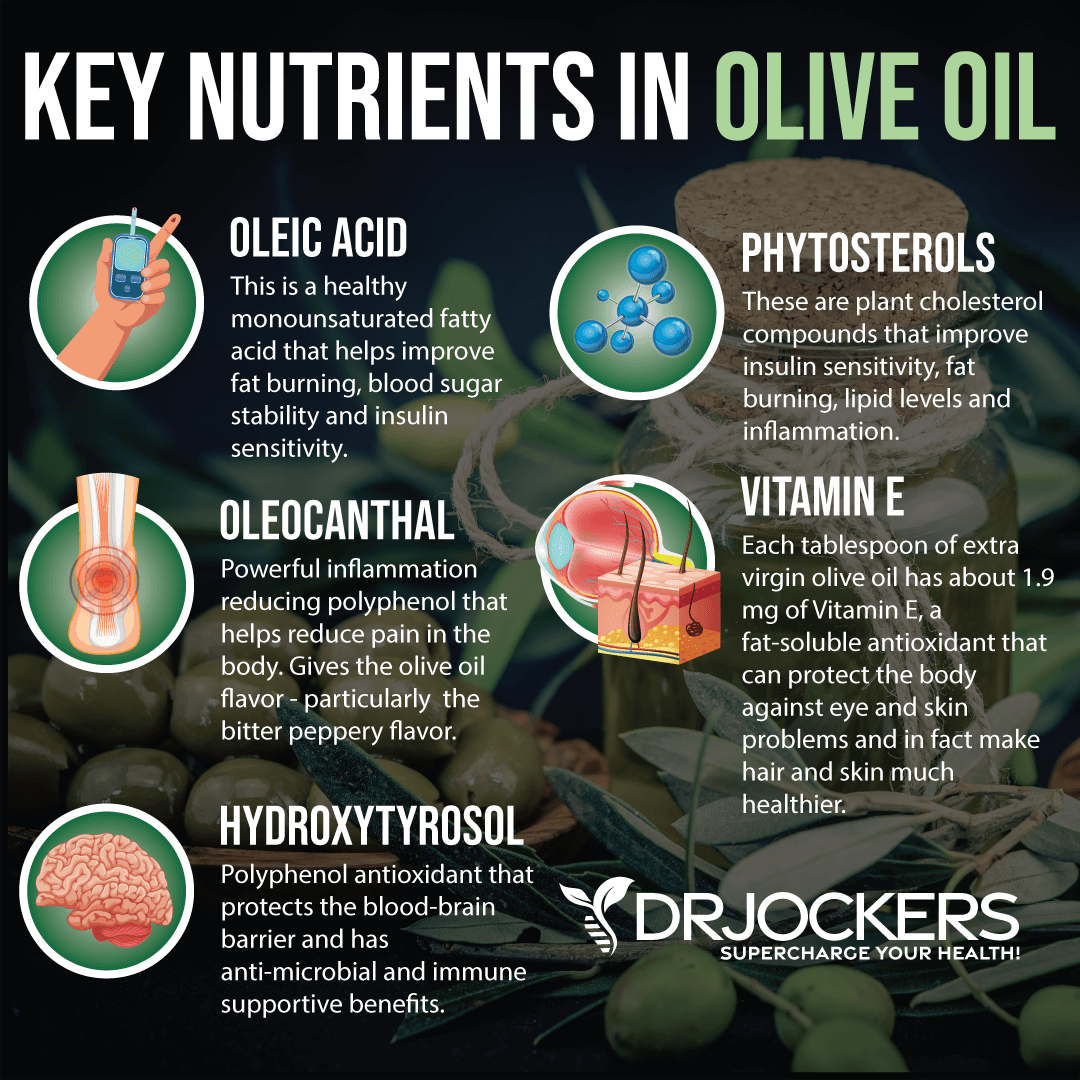
Key Nutrients in Olive Oil
The four key nutrients in olive oil include oleic acid, oleocanthal, hydroxytyrosol, and phytosterols. Let’s talk about them.
Oleic Acid
Oleic Acid is the most prominent fatty acid found in olive oil and a major contributing factor to its benefits. According to a 2020 review published in the Critical Reviews in Food Science and Nutrition, oleic acid may help to decrease inflammatory markers, such as C-reactive protein (CRP) in the body (4).
According to a 2020 review published in Advanced Nutrition, oleic acid may help to reduce obesity and support healthy body weight (5). Black olives are higher in oleic acid than green olives, but green olives are higher in antioxidants and polyphenols.
Oleocanthal
Oleocanthal is another key nutrient in olives. It is responsible for the burning sensation you may experience at the back of your throat when eating olive oil. Oleocanthal works similarly to ibuprofen and other anti-inflammatory medications, including Ibuprofen.
According to a 2019 study published in Nutrients, oleocanthal offers anti-inflammatory benefits (6). According to a 2021 study published in Antioxidants (Basel), it may help to lower inflammation and oxidative stress in arthritis (6).
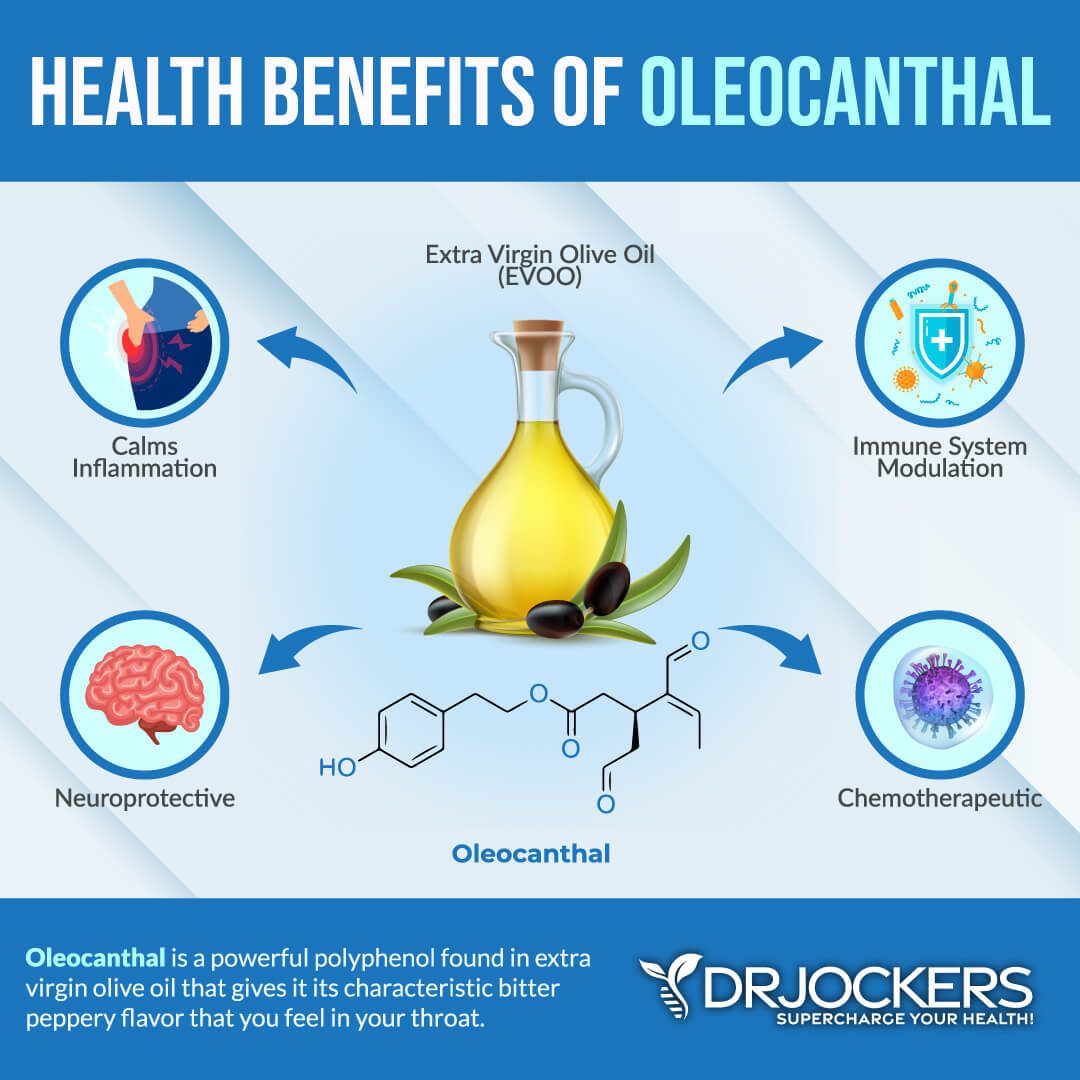
Hydroxytyrosol
Hydroxytyrosol is a power polyphenol found in olive oil. It may help to fight free radicals, reduce oxidative damage, offer antimicrobial properties, protect the blood-brain barrier, and reduce inflammation.
According to a 2019 review published in Molecules, hydroxytyrosol may have many health benefits, including anti-inflammatory, neuroprotective, cardioprotective, lipid-regulating, weight-regulating, anti-diabetic, anti-cancer, antiviral, antibacterial, metabolism-supporting, and other benefits (8). According to a 2014 review published in Frontiers in Nutrition, it may offer benefits for cardiovascular disease, cancer, and HIV/AIDS (9).
Phytosterols
Phytosterols are another key nutrient in olive oil and other fruits, vegetables, and whole grains. Phytosterols are similar to cholesterol and thus compete with cholesterol in your body for absorption. As a result, they may help to lower LDL and triglyceride levels and raise up the good cholesterol, and HDL levels.
According to a 2018 study published in Lipids in Health and Disease, phytosterols may help to improve blood lipid profiles and decrease obesity (10). According to a 2011 study published in QJM: An International Journal of Medicine, phytosterols may help to improve lipid levels (11).
Vitamin E:
Extra virgin olive oil is rich in Vitamin E. Each tablespoon of extra virgin olive oil has about 1.9 mg of Vitamin E, a fat-soluble antioxidant that can protect the body against eye and skin problems and in fact make hair and skin much healthier.
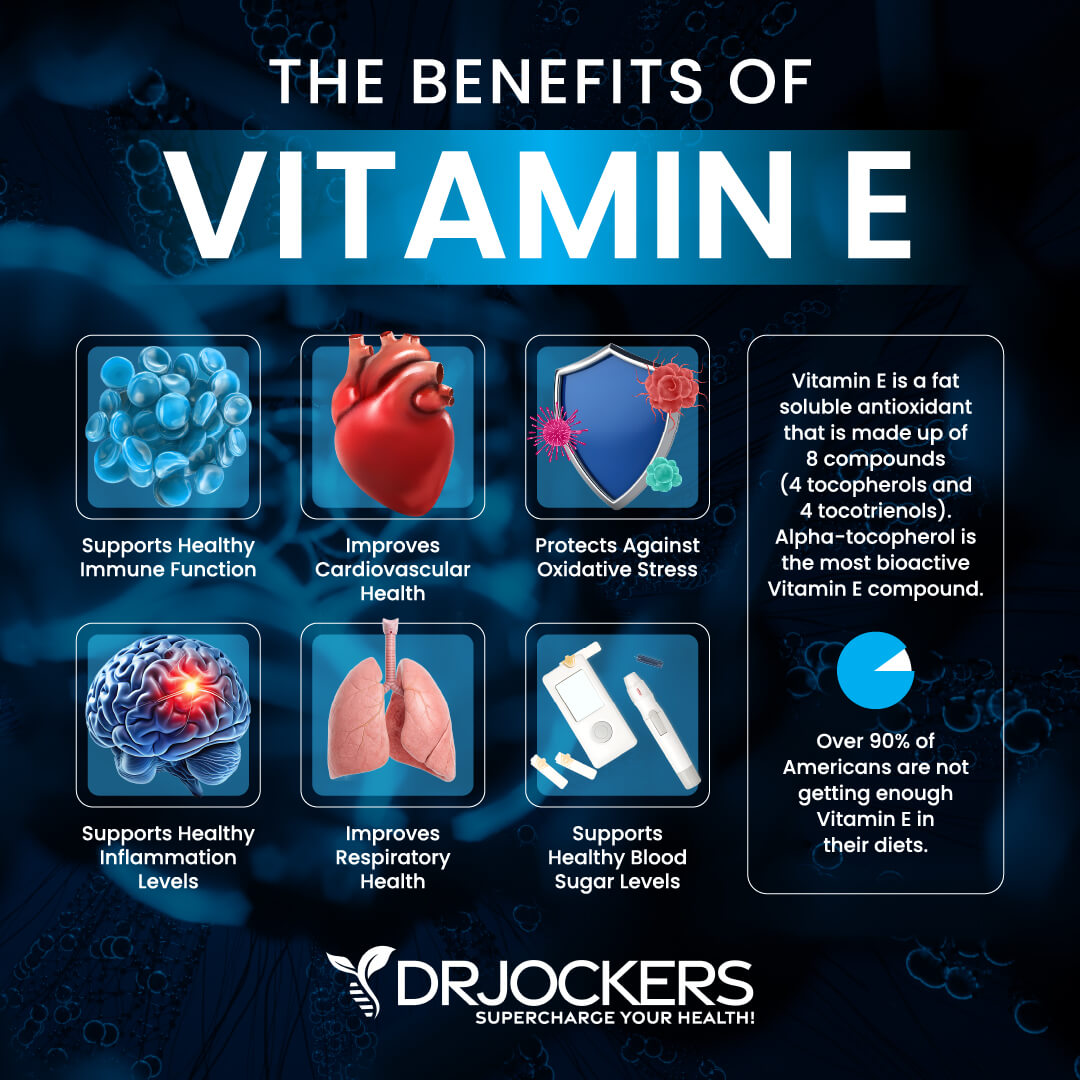
Nutrition Facts
Olive oil is mostly made up of monosaturated fatty acids. The most important of these is oleic acid.
One tablespoon of extra virgin olive oil has around:
- 119 calories
- 14 grams of fat, out of which 9.8 grams are monosaturated fat
- Zero protein
- Zero sugar or carbs
- 8 micrograms of vitamin K, which is about 10 percent of your recommended daily value (DV)
- 2 milligrams of vitamin E, which is about 10 percent DV
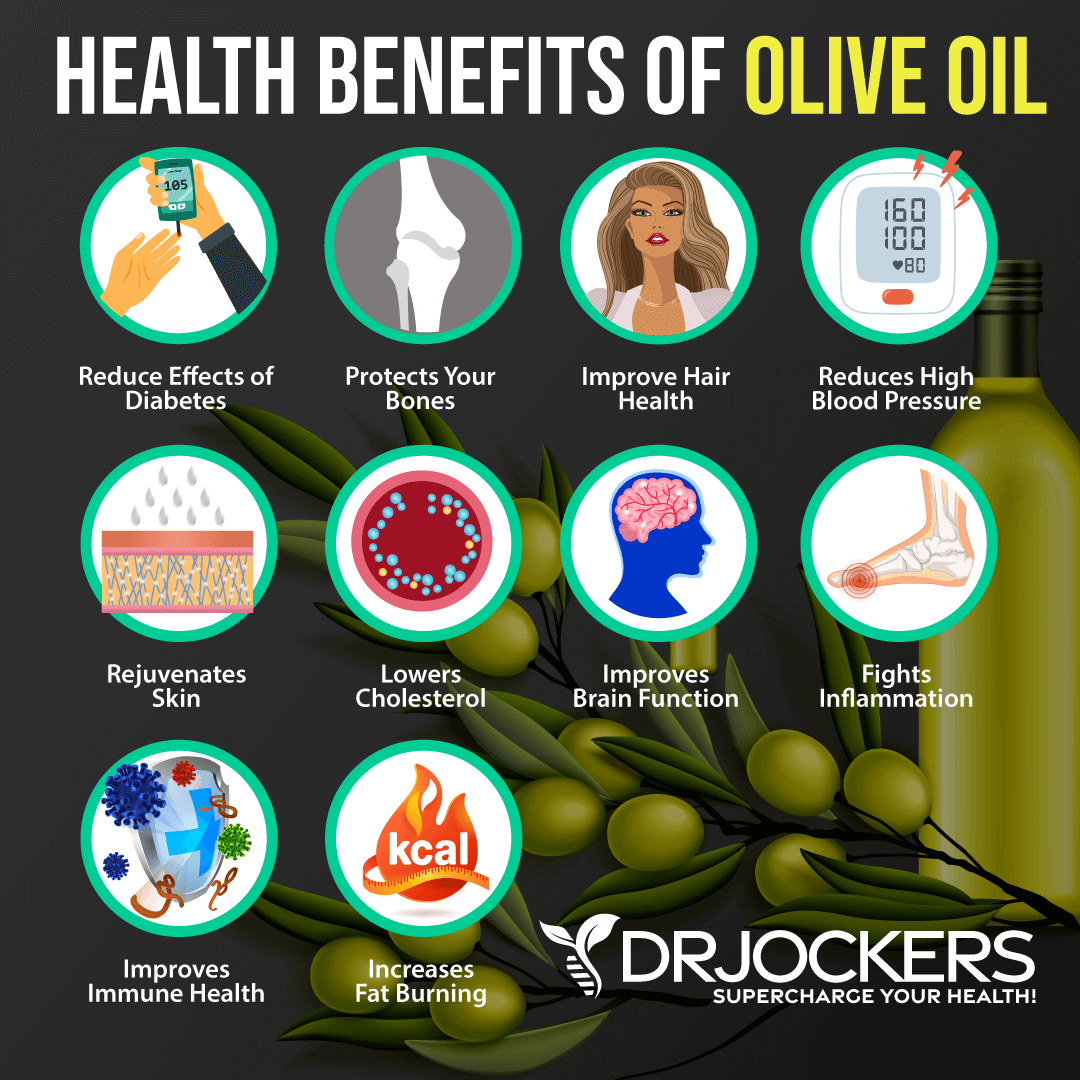
Health Benefits of Olive Oil
Olive oil offers many health benefits, including heart health benefits, weight loss support, improved insulin sensitivity, brain health support, immune health benefits, anti-cancer benefits, anti-aging effects, and improved mood. Let’s discuss these benefits in detail.
Heart Health
Better heart health is one of the most commonly known benefits of extra virgin olive oil. According to a 2006 study published in Clinical and Investigative Medicine, the Mediterranean diet is high in alpha-linolenic acid (ALA) from olive oil and thus may help to reduce cardiovascular health issues (12). EVOO is also rich in polyphenols, which is a type of antioxidant with anti-inflammatory and cardiovascular benefits.
According to a 2009 review published in the Journal of Cardiovascular Pharmacology, olive oil may help to reduce blood pressure and support heart health (13). A 2018 review published in Endocrine, Metabolic, and Immune Disorders Drug Targets has found that consuming a high-MUFA diet with olive oil may help to reduce LDL cholesterol, lower triglycerides, and improve HDL cholesterol levels (14).
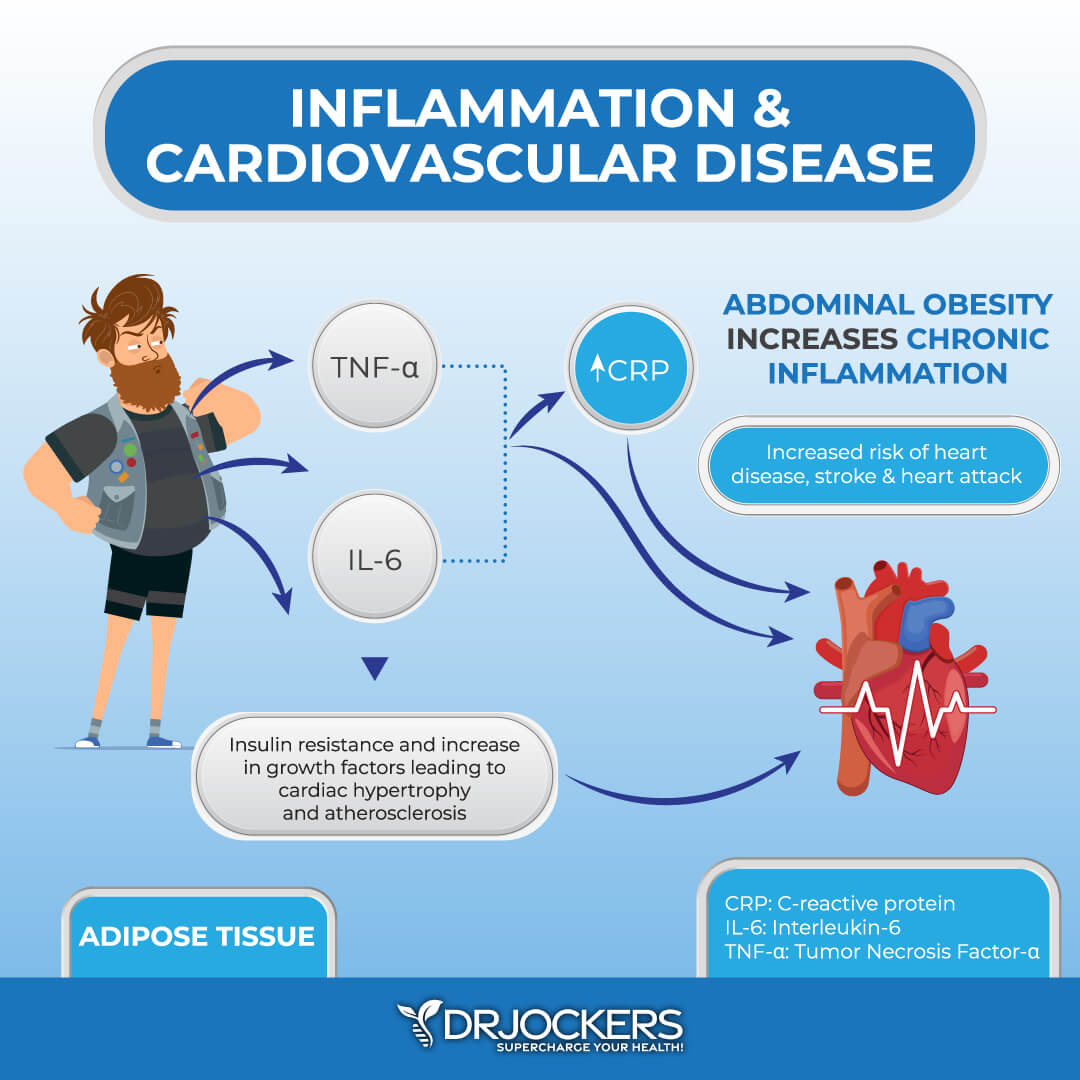
Aids Weight Loss and Insulin Sensitivity
Consuming EVOO may help to support your weight loss goal and improve insulin sensitivity. Fats are generally more satiating than sugar and carbs. This means that they reduce cravings, overeating, and snacking. This makes low-fat diets generally unsustainable in the long run leading to a yo-yo effect. According to a 2006 study published in Archives in Internal Medicine, people on higher-fat, low-carb diets lost more weight than those on a low-fat diet (15).
Those on a higher-fat diet also had better cholesterol levels. A 2010 study published in the Journal of Women’s Health has also found that an olive oil-rich, higher-fat diet improved weight loss compared to low-fat diets (16). Moreover, according to a 2020 review published in Advanced Nutrition, oleic acid in olive oil may help to reduce obesity and support healthy body weight (5).
Olive oil may improve membrane function, insulin signaling, enzyme activity, and gene expression, thus may improve glucose metabolism. According to a 2009 review published in Progress in Lipid Research, olive oil may help to improve insulin sensitivity and reduce the risk of type 2 diabetes (17). Eating too many carbs can increase blood sugar while fats help to stabilize blood glucose and insulin levels.
Adding EVOOs to your meals may help to slow down the sugar entering your bloodstream. Because it may help to make you feel more satisfied after meals, it reduces your risk of reaching for sugary junk food.
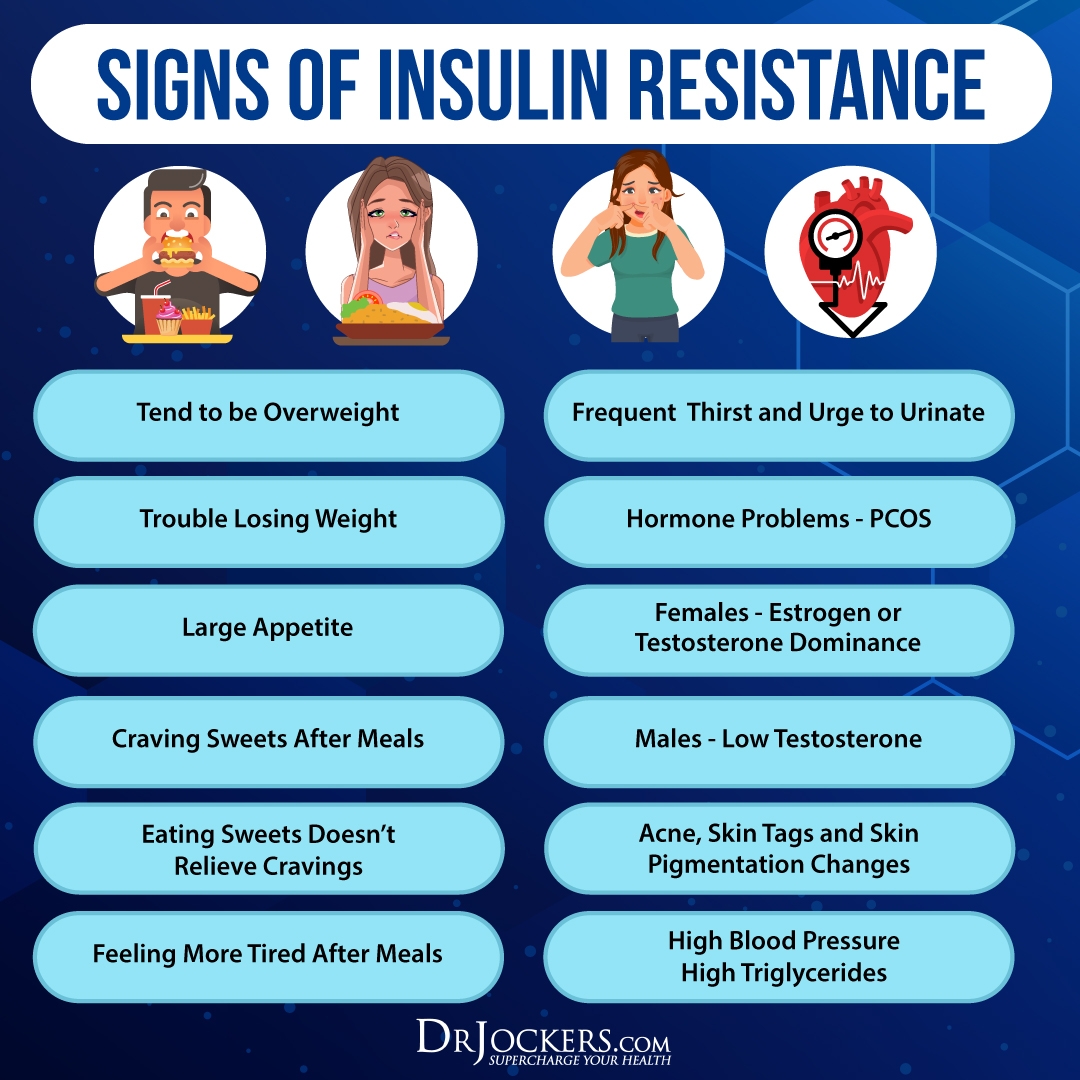
Supports Brain Health
Olive oil offers anti-inflammatory benefits and may support brain health. According to a 2009 review published in Acta Neurologica Taiwan, much of your brain is made up of fatty acids and needs plenty of fatty acids to function well daily (18). This means that your brain needs fats to perform tasks, focus, memorize things, think clearly, and support a healthy mood.
A 1999 study published in Neurology has found that olive oil and MUFAs may support brain health as we age and may help fight age-related cognitive decline (19). According to a 2021 book, Olives and Olive in Health and Disease Prevention published by the Academic Press, extra virgin olive oil supports cognition and brain health (20).
Researchers found that the neuroprotective qualities of EVOO may help to improve memory, delay cognitive decline, support verbal fluency, improve visual memory, and reduce the risk of developing dementia and Alzheimer’s disease.
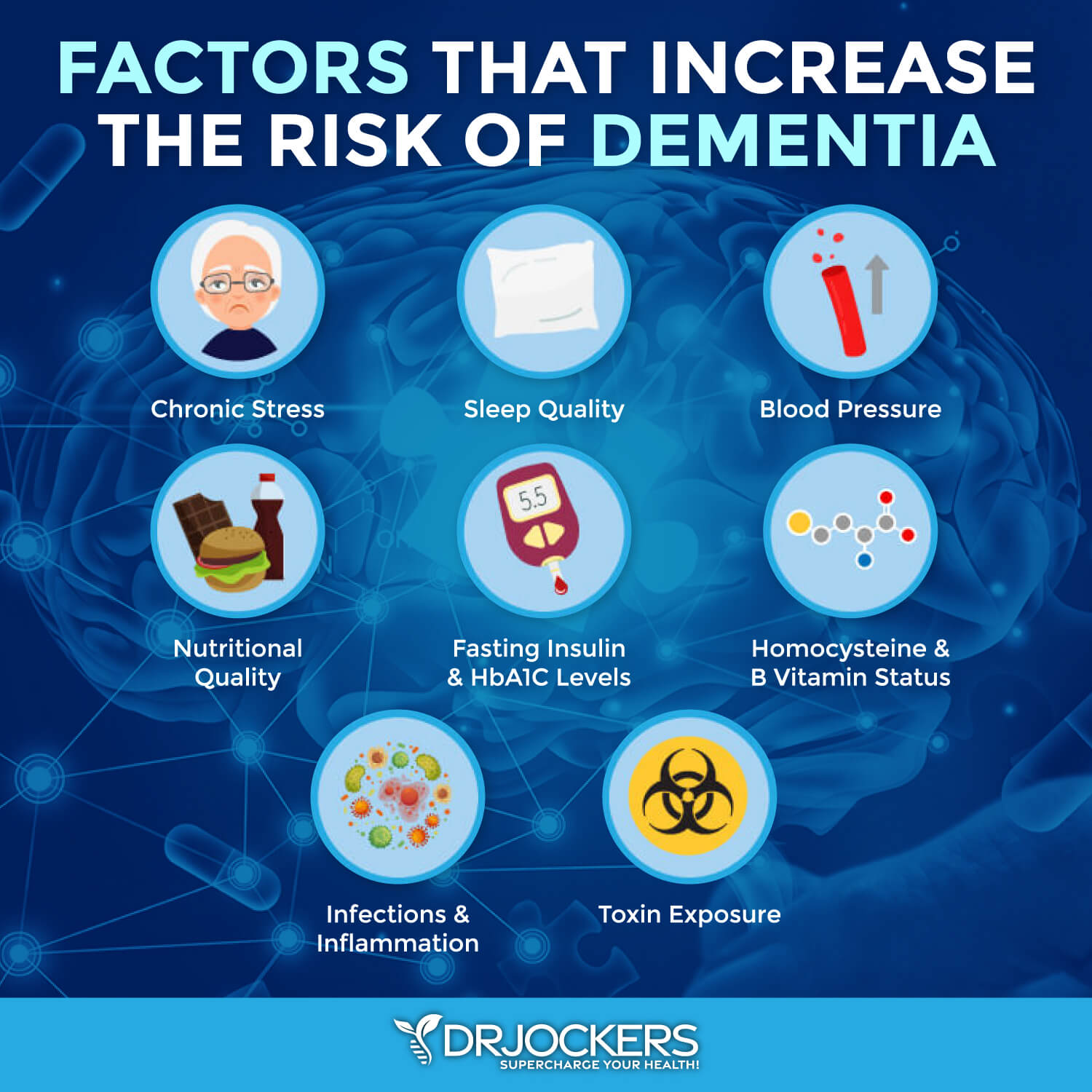
Immune and Anti-Cancer Benefits
Olive oil may also help to support your immune system and reduce the risk of cancer. A 2018 study published in the International Journal of Molecular Sciences has found that olive oils are rich in antioxidants, including polyphenol that may help to reduce the risk of cardiovascular disease, neurodegenerative diseases, and cancer (21). According to a 2019 study published in Nutrients, the compounds in EVOO help to support your immune system and reduce inflammation (23). They are also rich in anti-cancer agents, such as squalene and terpenoids, and peroxidation-resistant lipid oleic acid.
According to 2018 published in Endocrine, Metabolic and Immune Disorders Drug Targets, olive oil may help to protect your immune system (24). According to a 2004 review published in the European Journal of Cancer Prevention, olives and EVOO may play a beneficial role in cancer prevention thanks to their active compounds, such as tyrosol, hydroxytyrosol, and phenyl (25).
According to a 2018 study published in Nutrients, EVOO may help fight inflammation, free radical damage, carcinogenesis, and gut microbiome imbalance and support the treatment of colorectal cancer (26). Olive oil may even support health not only when it comes to reducing the risk of cancer and supporting recovery, but also after recovery from cancer. A 2010 study published in the Journal of Women’s Health has also found that olive oil-rich higher fat diets improved weight loss compared to low-fat diets in survivors of breast cancer (16).
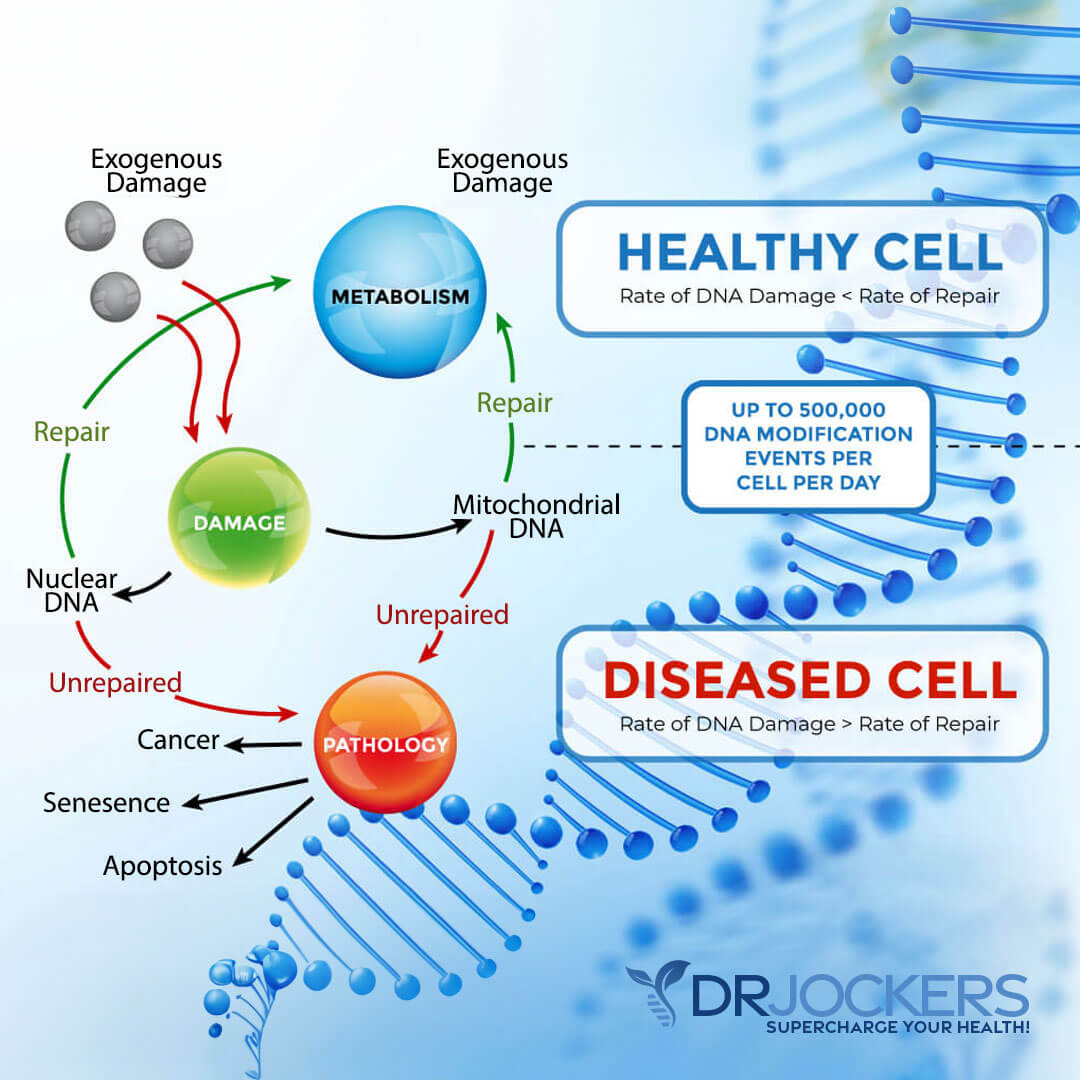
Anti-Aging
Adding olive oil to your diet may also help to reduce signs of aging. EVOO is rich in antioxidants. One of these antioxidants is secoiridoid, which helps to activate genes that lower cellular stress and thus offer anti-aging benefits.
According to a 2013 article published in Cell Cycle, secoiridoids in olive oil may help suppress gene expression connected to the Warburg effect, which is a process connected to cancer formation (27). They found that secoiridoids may help to reduce the risk of age-related skin cell changes.
A 2016 study published in Molecules has linked olive oil to increased longevity and reduced risk of age-related health issues (28). A 2019 analysis published in Foods has found that consuming olive oil may be linked to higher scores on the successful aging index (SAI) compared to not eating olive oil among those over 70 (29). Thus, EVOO may help to reduce the visible signs of aging and lower the risk of age-related health issues.
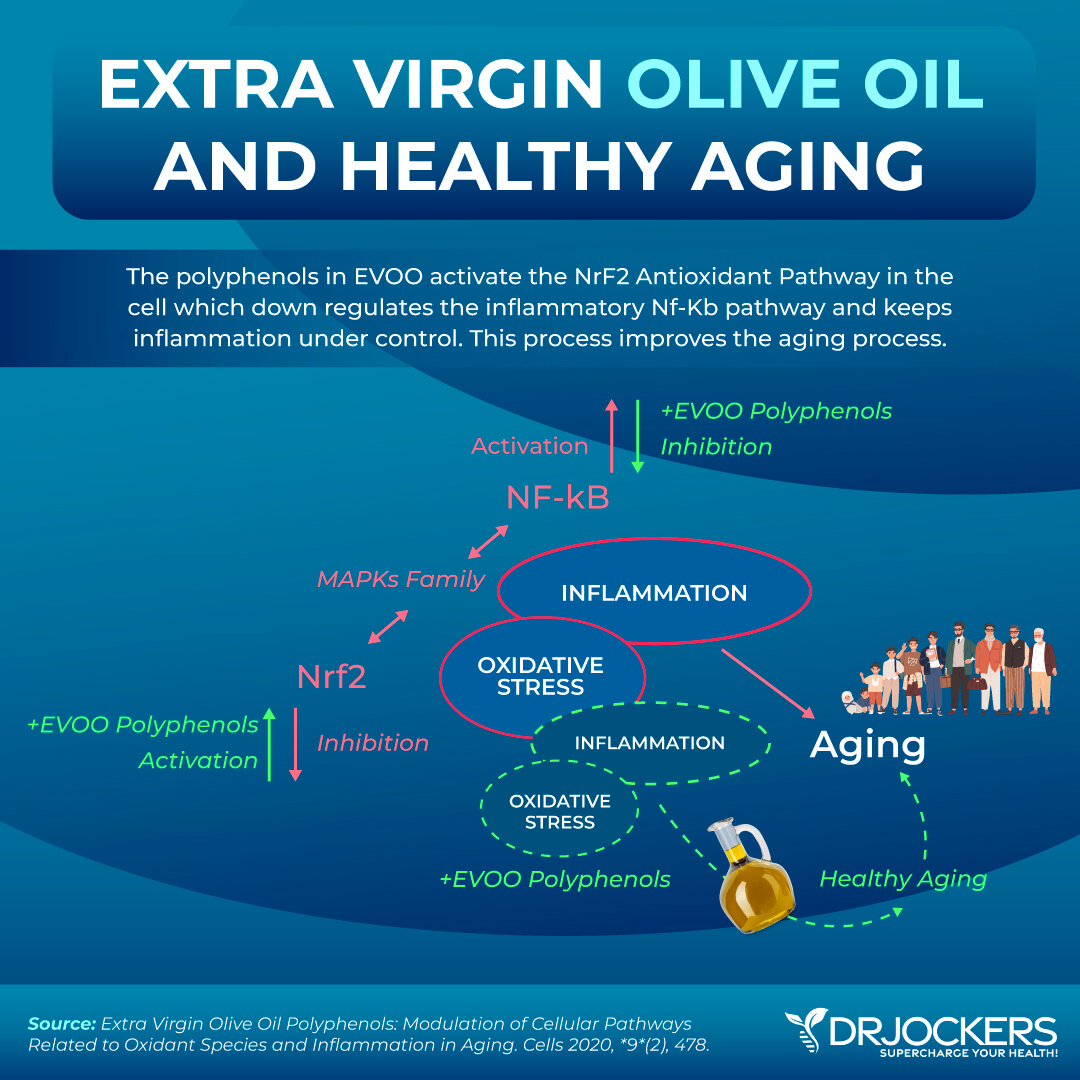
Supports Healthy Mood
You already know that EVOO may offer anti-inflammatory benefits and may support brain health. Thus, it may not be surprising that it may be great for a healthy mood as well. Cognitive and mood issues can often co-occur.
When your brain doesn’t get enough serotonin or dopamine, those much-needed ‘happy hormones’, it can interfere with sleep, thought-processing, and mood regulation. EVOO may help to reduce neurotransmitter dysfunction, anxiety, and depression.
According to a 2009 review published in Acta Neurologica Taiwan, your brain needs plenty of fatty acids to function well on a daily basis, including for a balanced mood, thinking, memorizing, and performing cognitive tasks (18). According to a 2011 study published in PLoS One, MUFAsm including olive oil may help to reduce the risk of depression (30).
They also found that higher trans-fat consumption combined with a lower MUFA and PUFA intake may increase the risk of depression and mood disorders and may make treatment more difficult. Hence, less trans-fats and more olive oil may help to improve your mood and reduce the risk of mood-related issues.
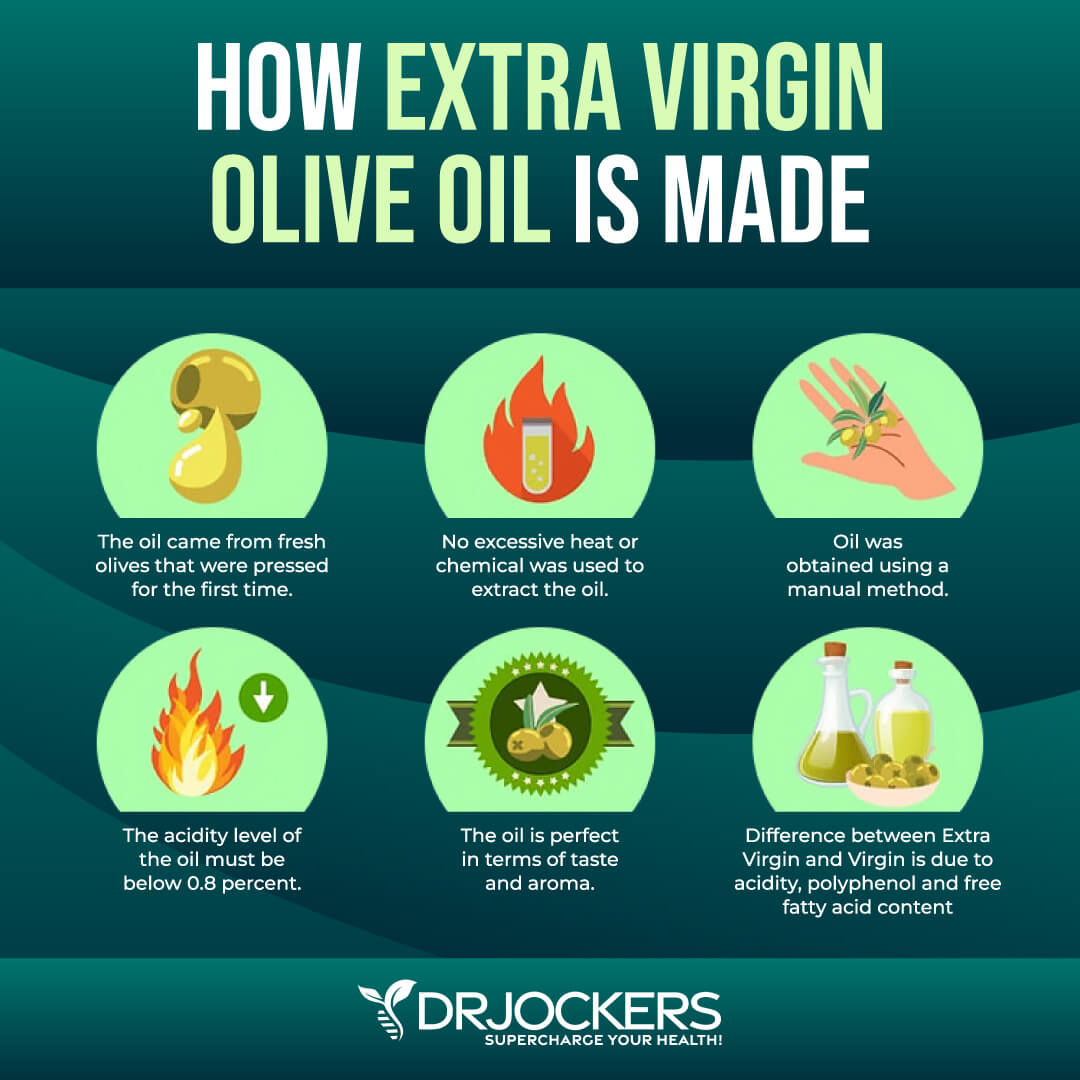
How to Buy Olive Oil
The kind of olive oil you buy matters. There are a few main olive oil types or classifications you need to know about. These classifications are determined based on how the olive oil was harvested and manufactured.
You may find the following types of olive oil at your grocery stores:
- Extra virgin olive oil: EVOO is produced by cold-pressing. It does not use any chemicals from refinement and also doesn’t use high-heat manufacturing processing that may destroy some fatty acids and nutrients. It’s the highest quality of all.
- Virgin olive oil: Virgin olive oil is created from a second pressing after extra virgin olive is created. It may come from riper olives. While extra virgin olive oil is the highest quality, this is generally still good quality.
- Light olive oil: Light olive oil and olive oil blends are created from refined olive oil. They are sometimes mixed with other vegetable oils as well. They tend to be chemically processed, of lower quality, made with high-heat processing, and have a rancid smell. I recommend absolutely avoiding this type of olive oil.
Now another problem is that according to a CBS report, about 70 percent of EVOOs on the market are watered down with other oils (31). This means that you can’t always trust the labels.
Being lied to is a problem itself, of course, but an even bigger issue is that these watered-down and fake olive oils can pose some health risks to your health and also don’t possess all the beneficial qualities of real olive oil. When looking for a real high-quality EVOO, always read the label.

Look For The Following When Buying Olive Oil:
- Make sure that it’s indicating that it’s EVOO and cold-pressed or expeller-pressed.
- Look for the International Olive Oil Council (IOC) label on the seal indicating the certification of what type of oil is being used.
- Look at the harvesting date on the label. This helps to see if the oil is still fresh. A high quality olive oil should last for up to two years when unopened and kept from heat and light during storage. Once opened, keep it in a dark and cool place. It should last for a few months.
- Look for dark bottles, such as green and black, that protect the olive oil from light entering and damaging fatty acids. These bottles protect the oil from oxidation and from turning rancid.
- Look for the estate name on the bottle. Small olive oil producers that pride themselves in the quality of their products generally put their estate name on the bottle.
- Look for the country of origin on the bottle as well. While Italy, Spain, and Greece are the largest producers of olive oil, some of the highest quality olive oil comes from Chile, Australia, South Africa, New Zealand, Croatia, Argentina, and the US. You can seasonally rotate your olive oils throughout the year based on the origin. In September, the freshest olive oils come from the Southern Hemisphere, while in January, they are from the Northern Hemisphere.
- If you are experiencing a peppery cough, or a peppery, or somewhat bitter taste, it means your olive oil is rich in antioxidants and polyphenols. If it does not cause a bitter or peppery taste, it’s lower quality, rancid, old, or fake.
- Check the price. True extra virgin olive oil will not cost less than $10 a bottle. High-quality EVOO will likely cost more than that. Remember, you are investing in your health. Cheap oils can damage your health.
- Another indicator of a high-quality olive oil is that it solidifies when cold and refrigerated because of the chemical structure of the fatty acids. If it stays liquid in the fridge, it’s not extra virgin olive oil.
- Don’t worry about the color. The color of the oil (lighter or darker) does not indicate taste or quality.
- Don’t be fooled by cool packaging. Creative colorful packaging and fun copy don’t necessarily indicate high-quality. However, do look for any indication if the manufacturer has won any international competitions and has been recognized for their excellence.
- Consider mother nature. Remember, the olive oil you loved last year may taste a bit different this year because of the season. Explore different oils and find your favorite. Make this a culinary adventure.
- Buy from a retailer with a brisk turnover. This is a great way to ensure that the olive oil you are buying is the freshest possible.
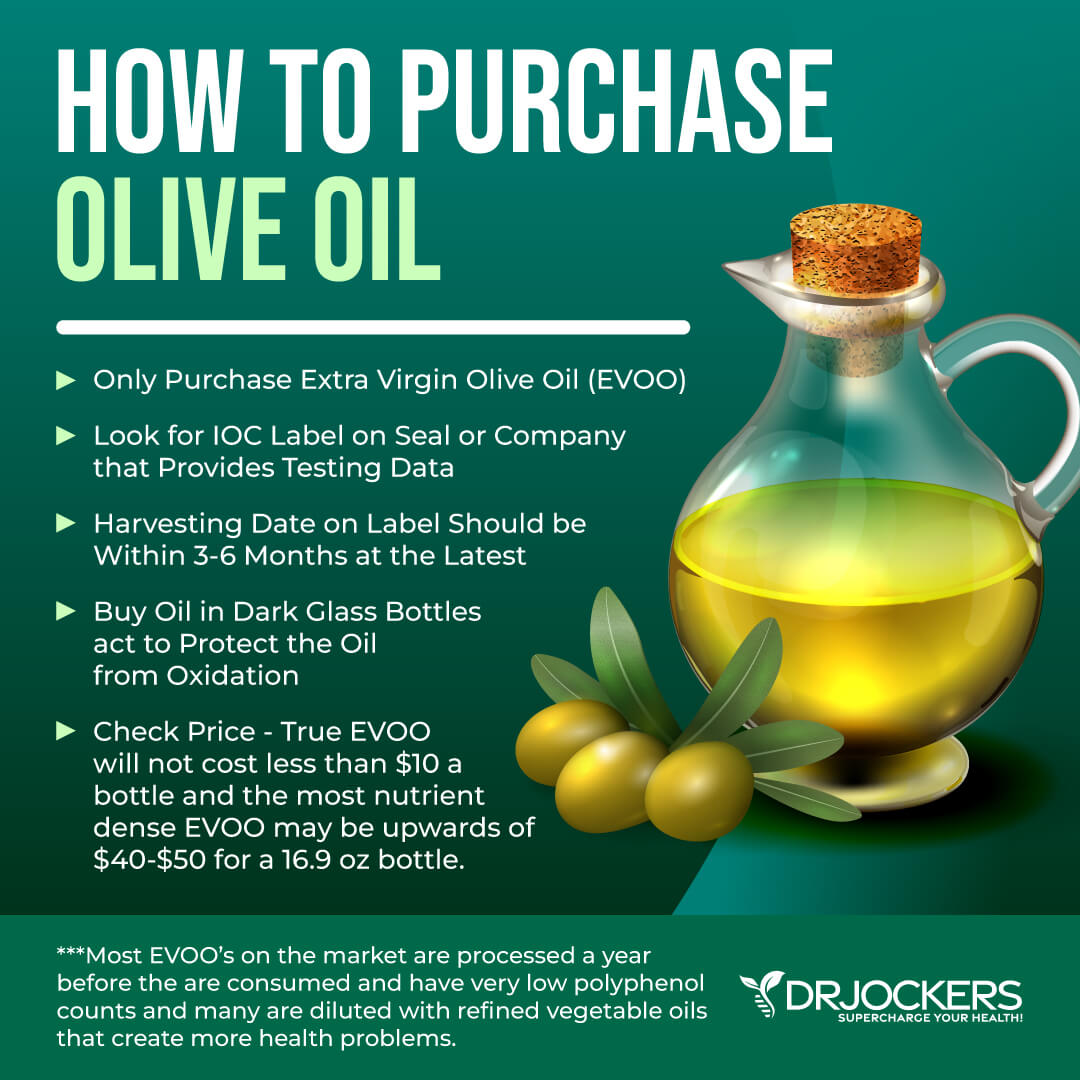
Should You Cook with Olive Oil
One of the concerns that many have with cooking with olive oil is its low smoke point and the fact that it starts to decompose around 200 degrees Fahrenheit. Some older studies and discussions only looked at the smoke point as a reference for safety.
But they disregarded potential toxic effects. A 2018 study published in the Acta Scientific Nutrition of Health, on the other hand, has found that the smoke point is not a good reference (32). Instead of simply measuring smoke points, they measured the toxic compounds that were released during cooking. They had some surprising results.
They performed two tests. They heated the oils gradually from 25 to 240 Celsius (77 to 464 Fahrenheit) and then measured them at every 30-degree increase. They also heated the oils at 180 Celsius (356 Fahrenheit) for 6 hours, which is much longer than many slow cooking methods recommend. They measured samples at 30, 60, 180, and 360 minutes.
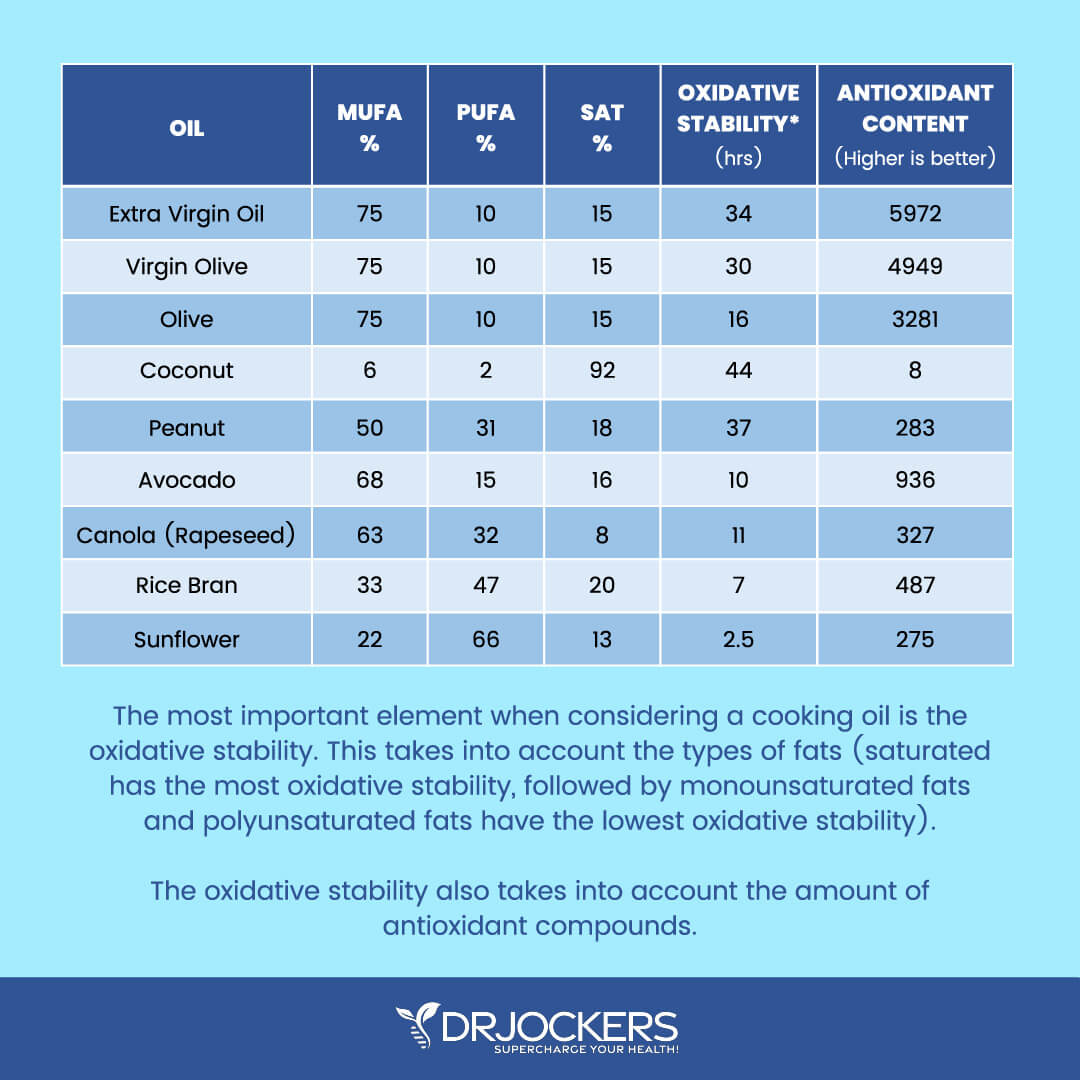
In each sample, they looked at oxidation, oxidation stability, fatty acid profile, and toxic byproducts or polar compounds. All the samples were cooled and analyzed later. The oils that were tested included: EVOO, virgin olive oil, olive oil, canola oil, rice bran oil, grapeseed oil, coconut oil, high oleic peanut oil, sunflower oil, and avocado oil.
They looked at canola and grapeseed oil, which both have high smoke points and in theory, should be stable at higher temperatures. Yet they found that both showed a significant spike in polar compounds and toxicity at over 150 Celsius. On the other hand, avocado and refined olive oil fared better than canola and grapeseed oil. Researchers only noticed a small spike at over 180 Celsius.
The results of the study suggest that the smoke point of the oils is not a stable number and not an indication of safety. The oxidative stability, which is based on the level of saturated and monounsaturated fats, which are more stable than polyunsaturated fats, along with antioxidant compounds in the oil is a much more important factor.
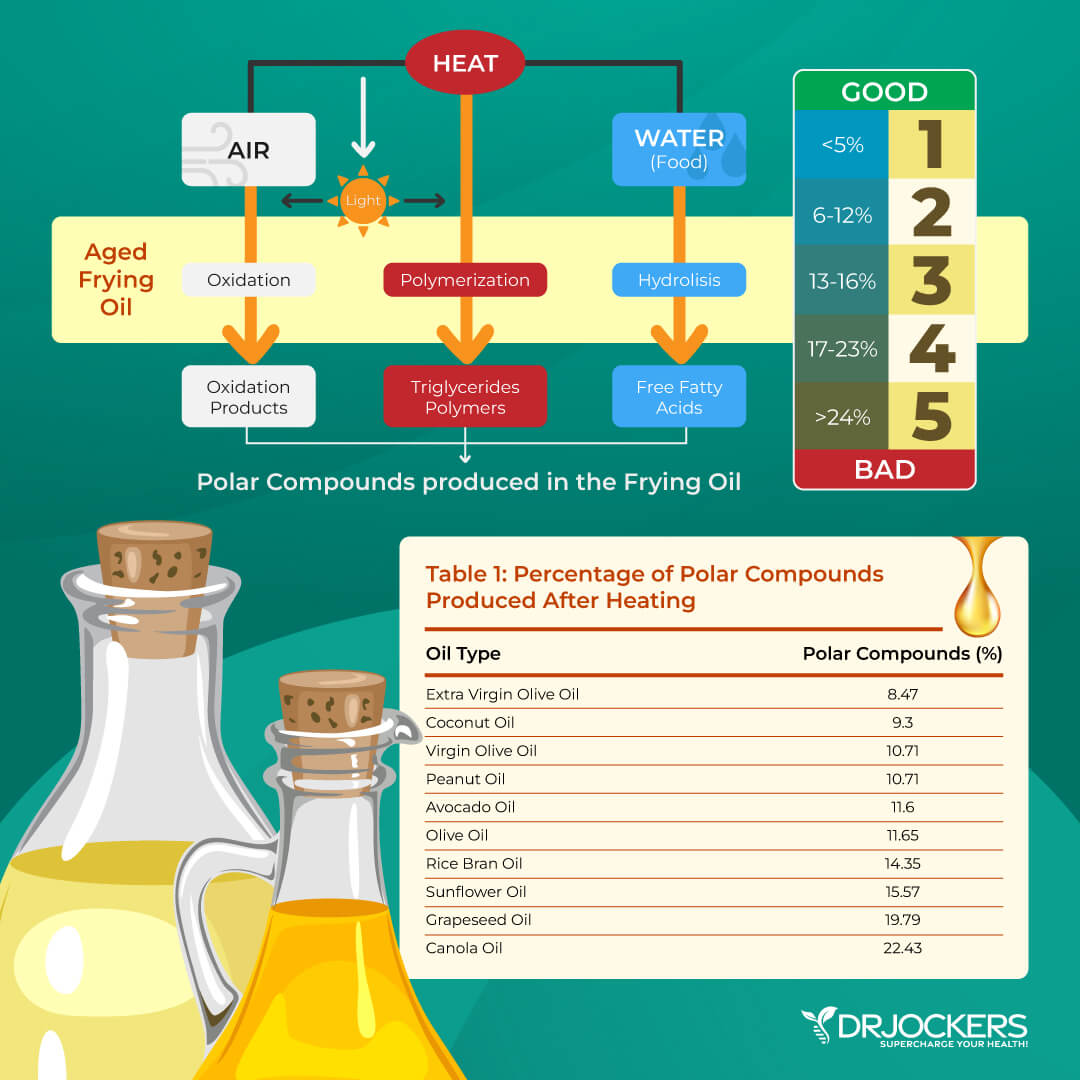
How Best to Use Olive Oil
Looking at the results, EVOO is clearly the best choice, and coconut oil is a close second. Other studies have shown coconut oil to be slightly more stable. The point is that olive oil has great oxidative stability and handles oxidation so effectively. However, as we discussed earlier, olive oils are not made equal, and it’s important that you use high-quality EVOO whether it’s for cooking or otherwise.
Many people still prefer to cook with saturated fats, such as high-quality grass-fed tallow, butter, or ghee as a safe and healthy animal source. Those are all fantastic choices that I encourage you to use in your kitchen. However, don’t shy away from cooking with EVOO either as it has great oxidative stability.
Additionally, you can use EVOO in your uncooked dishes. You can simply drizzle it on your salads and vegetables. You may mix it with some balsamic vinegar, dijon mustard, or other ingredients for a delicious salad dressing or dip for veggies or a gluten-free, low-carb, homemade, keto bread. You can mix it with seasoning and drizzle it on your grilled, sauteed, steamed, or roasted vegetables or meat after they’re finished cooking. You may add it to raw vegetable soups, pesto, spreads, and dips.
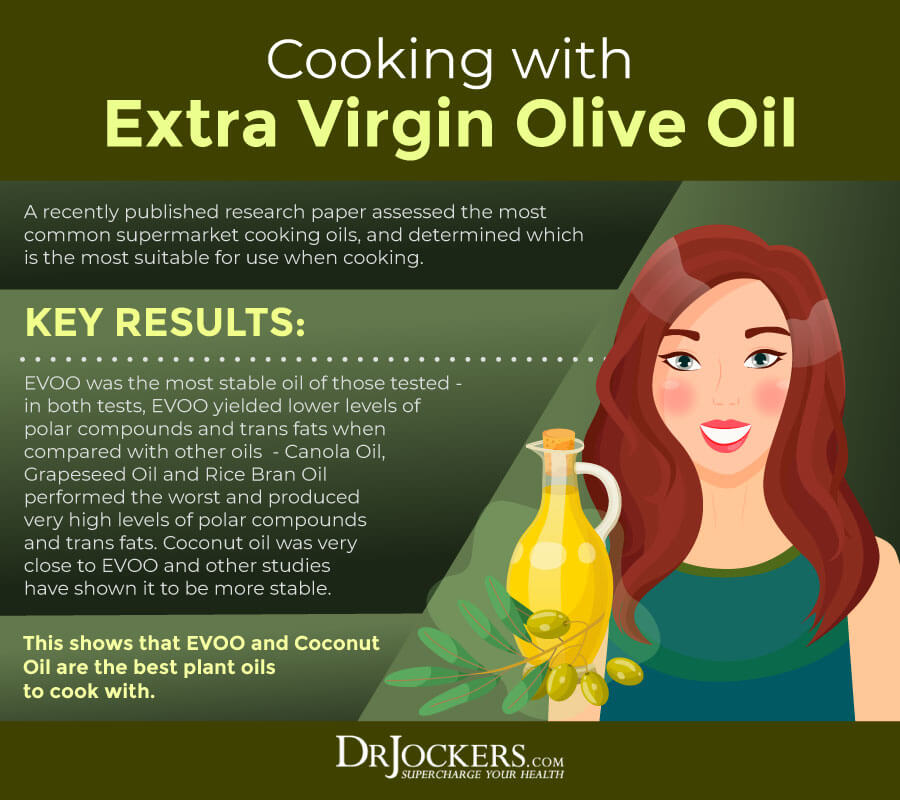
My Favorite Olive Oil
My favorite olive oil is this Fresh-Pressed Olive Oil. It is the most flavorful artisan olive oil you can find out there. It comes from award-winning artisan farms with a harvest-fresh taste to your table. These oils are independently lab-certified to be 100 percent extra virgin olive oil — so you can trust the quality. My family swears by it. We use it daily on our salads and meals. Our kids love it. I am sure your family will too.
I am excited to share a special offer with you. You can get this $39.00 bottle of Fresh-Pressed Olive Oil for only $1.00 to help with shipping if you click on the link here
Final Thoughts
Olive oil has been harvested for thousands of years. It is widely respected in nutrition circles for its health benefits, including anti-inflammatory, weight loss, cardioprotective, immune-supportive, and other health benefits. However, to enjoy the true benefits of olive oil, you have to be careful when buying it.
Only buy high-quality extra virgin olive oil instead of cheap alternatives. I recommend that you follow my guide on how to buy and how to cook with extra-virgin olive oil. Try my favorite extra-virgin olive oil, Fresh-Pressed Olive Oil for $39 with only $1 shipping.
For more advanced nutrition strategies including carb backloading and optimizing digestion, check out my advanced nutrition and recipe book the Keto Metabolic Breakthrough.
Inflammation Crushing Ebundle
The Inflammation Crushing Ebundle is designed to help you improve your brain, liver, immune system and discover the healing strategies, foods and recipes to burn fat, reduce inflammation and Thrive in Life!
As a doctor of natural medicine, I have spent the past 20 years studying the best healing strategies and worked with hundreds of coaching clients, helping them overcome chronic health conditions and optimize their overall health.
In our Inflammation Crushing Ebundle, I have put together my very best strategies to reduce inflammation and optimize your healing potential. Take a look at what you will get inside these valuable guides below!
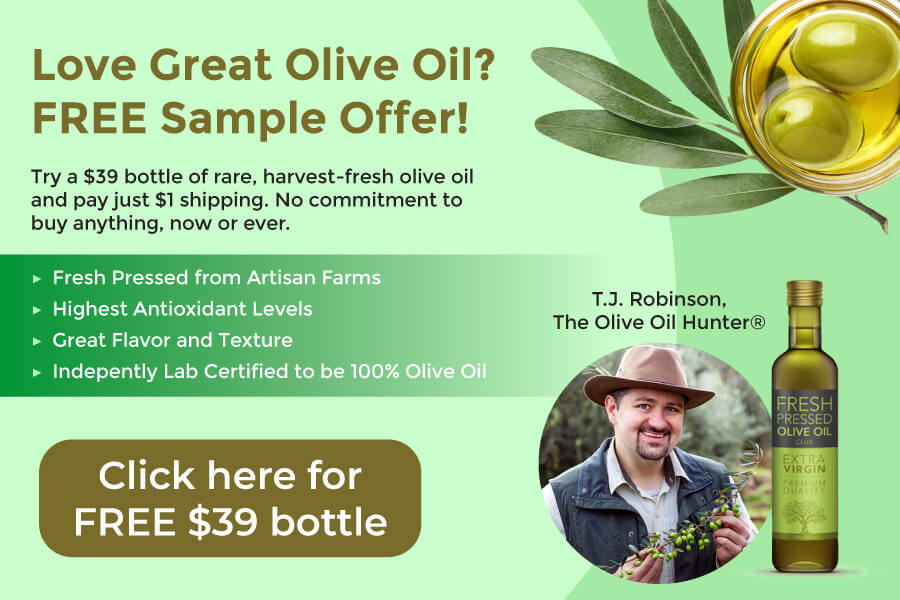
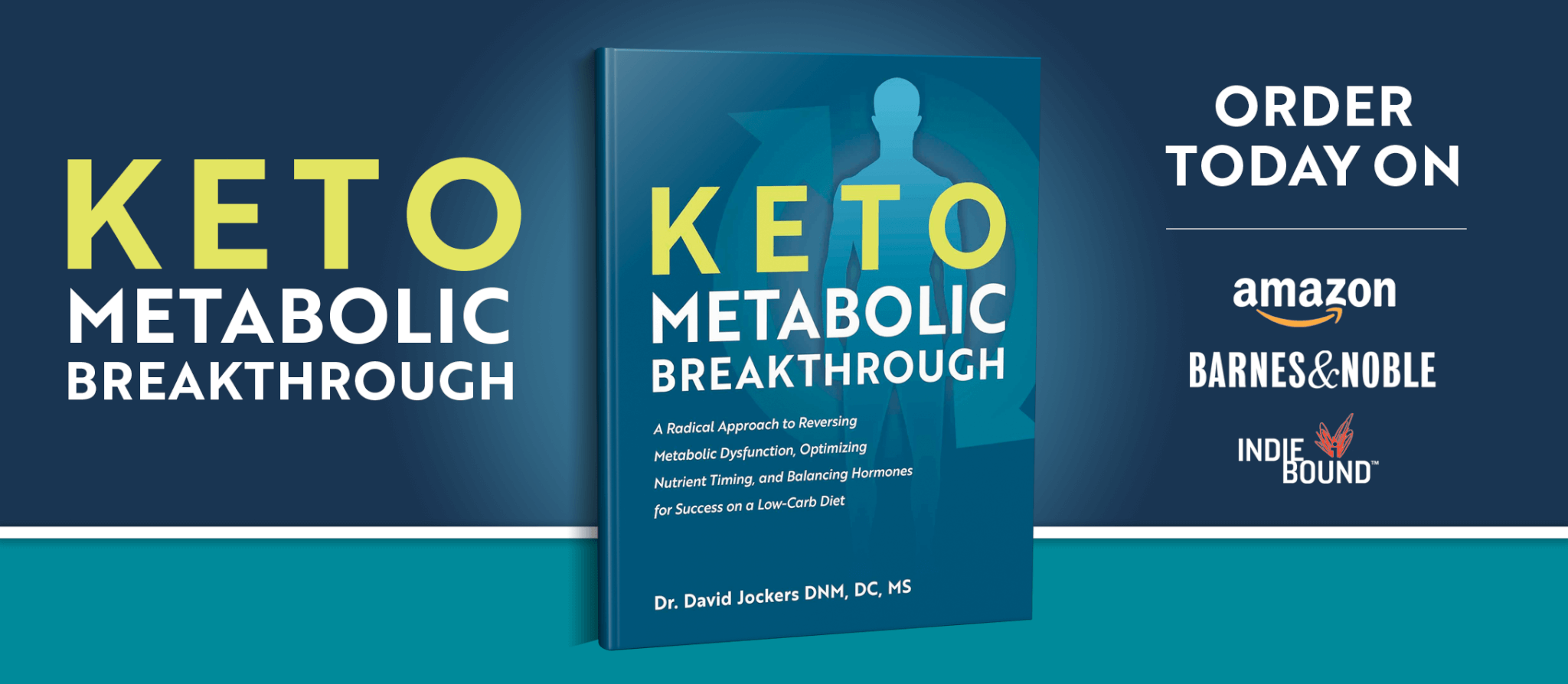




I subscribe to Kyoord EVOO because they provide a Certificate of Analysis for Total Polyphenols (1200mg/kg). I also subscribe to Life Extension Foundation EVOO because they do the same thing (800mg/kg). I had to read for 8 minutes (repetitive hype) before I got to the end of your Fresh Pressed Olive Oil Club…no Certificate of Analysis to be found. Without the COA for polyphenols, this might as well be motor oil. Since you didn’t publish a COA, this must be low-quality EVOO. FYI…I hate long-winded repetitive spiels. Give me the facts, the data. If the cost per polyphenol ratio is better than what I’m getting already, then I’ll buy yours. Otherwise, you just waste my time and aggravate me.
Lee, couldn’t have said it better myself!!!!
In this era of online “webinars” that go on & on, only to find at the end it was all to market a product is too time-consuming. I agree with you 100%. If you have a product to market, make it a short, bullet-point presentation & then offer the product, with all cost details ie. shipping costs, etc. shown transparently. Don’t waste my time on abstract details which are not necessarily required! Btw, GREAT POINT on the IOC & COA tag!
Cheers!
Oh, & btw, clicked on the offer for the $39 bottle for $1 & my computer refused to open the link due to security issues!
Hello Lee,
Great question. All the labs/polyphenol counts are provided upon request for our oils. Member Services can be email at MemberServices@FreshPressedOliveOil.com
Freshness is still the crux of the biscuit. Freshness as defined by the time the time between the oils being makes and when you open the bottle in your home. Polyphenol levels are typically only tested at the time of pressing.
Polyphenol rates drop dramatically in the first 6 months after pressing.
So, if you’re not asking *when* the oil was pressed (not bottles but actually pressed) and *when* the COA was performed it may not be an accurate assessment.
A high polyphenol oil at the time of pressing that’s been sitting in a warehouse for 1-2 years may no longer be a high polyphenol oil in the bottle now.
You’ll be hard pressed to find a producer that re-tests and reports the polyphenol labs every 6 month.
In the example below, Kyoord, the oils is pressed one time a year (true of all oil,) and sold all year long. They may even be selling a previous years harvest. You’d have to ask them.
Our club avoids the “problems” of letting oils sit in storage all year long, dropping in freshness, by sourcing only as much as we need for club member from four different harvest, and providing fresh oils every three months.
Please email Member Services at MemberServices@FreshPressedOliveOil.com
My dad lived to 101 and the only health issue he had was an occasional cold and had to stay in bed for the last year of his life because of vertigo. Moreover, he had no teeth beginning in teens. But that was in Barbados, W.I. I too, lost all of my upper teeth by age 19 and had to wear a full top denture and a partial upper at age 17(we had no toothbrushes) I’ve been in the USA for 60 years and am in relatively great health and at almost 80 years (Feb 15), I work out on rebounder and a power plate and I eat only two meals per day, one cup of coffee and a few cups of Macha tea daily. Life is great!
Thanks for sharing!
Dr Jockers,
Where do you buy your High Polyphenal Extra Virgin Olive Oil?
The Fresh Pressed EVOO that I discuss at the bottom of the article
I am wondering about Organic Olive oil. I worked at the USDA for a while calling farmers and ranchers for statistical purposes. I have been organic ever since. None of the people I spoke with cared one bit about the chemicals they put on their crops. And the Almond Ranchers were the worst. They thought it was safe to spray pesticides on the almond flowers after dusk because the bees had gone to bed and that the chemicals wouldn’t hurt the bees the next day when they were climbing on the flowers. I was stunned. Is there an organic Olive Oil your recommend? And lately I have heard that it is possible to buy an organic license without proof of actual organic farming practices. What?!!